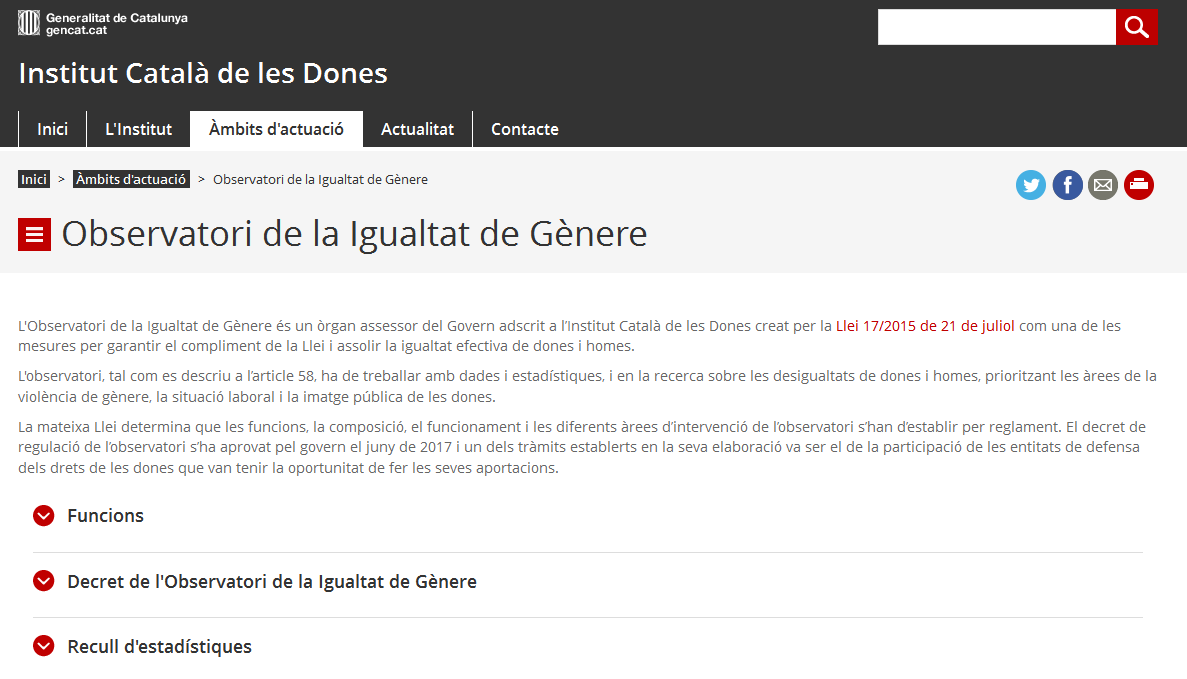
The media systematically show us examples of the persistence of discriminatory situations for women such as the gender wage gap, the lack of women in managerial positions and the violence towards women, among other things.
These situations are a result of our social construct which is still based on an androcentric model where man is placed at the centre, as a reference of values and of the view of the world while at the same time subordinating women and rendering them invisible.
Taking advantage of the fact that today is March 8, International Women’s Day, we would like to review and reflect on how we are tackling this reality with the Government of Catalonia’s public policies.
The history of gender policies of the Catalan Government Administration goes back a long way. The Catalan Women’s Institute was created almost 30 years ago and it was this institution which began to formulate programmes for equality with the aim of guaranteeing real equality between men and women. In this context, the concept of equality has been reinterpreted and broadened and is now multidimensional:
- Formal equality: the affirmation of the equality of rights in legislation
- Equality of treatment: the absence of direct or indirect discrimination for reasons of sex
- Equal opportunity: the compensation of existing inequalities in the conditions and positions of women and men
- Gender equality: the assessment and consideration of the diversity and differences between women and men
The evolution of the concept of equality has run parallel to the evolution of strategies for intervention by public administrations. The first programmes of policies for women were centred on guaranteeing equal rights and on the absence of discrimination between men and women. Later, once the shortcomings of this concept had been verified, new measures for positive action were introduced to guarantee equal opportunities. More recently, gender mainstreaming has been introduced and prioritised.
Gender mainstreaming is a concept that arose in Sweden in the early nineties of last century to promote policies for women and was incorporated in the international agenda within the framework of the 1995 Fourth World Conference on Women held in Beijing. The inclusion of this strategy to develop policies for women was a turning point.
Gender mainstreaming in the area of the Catalan Government requires the incorporation of the gender perspective in all policies and the promotion of specific actions in favour of women from the different areas of Government Administration. This is the framework within which work is being done at present by the Government of Catalonia. The Department of Health has taken part in the six programmes led by the Catalan Women’s Institute and also in elaborating the four reports on gender mainstreaming.
On the other hand, the drive and implementation of measures and actions linked to gender policies in the Department of Health takes place within the framework of the Work Group for gender mainstreaming. This group is made up of people of reference from all the units and entities of the department, including the Agency for Health Quality and Assessment of Catalonia (AQuAS), and it is coordinated by the Technical Cabinet of the General Secretary.
Aside from the achievements made based on measures taken and actions carried out, some of the most significant advances have been those made via regulation. Particularly noteworthy are:
- Organic Law 3/2007 for effective equality of women and men
- Law 5/2008 of the right of women to eradicate male violence
- Law 17/2015 of effective equality of women and men
Among the most noteworthy aspects of the Law of Equality (2015) is the regulation of interdepartmental bodies for coordination, in charge of applying gender mainstreaming both consultative and advisory in nature, and also of implementing mechanisms of collaboration, cooperation, control and sanction. Via this Law, the creation of the Observatory for Gender Equality was foreseen, a body which began functioning last June and of which the AQuAS forms a part of.
Despite the progress made, a lot of work remains to be done which we need to do together, not only as a legal obligation but also as a commitment to building a fairer society. No policy is neutral, and it affects men and women in different ways and this is why it is essential for us to put on our “gender glasses” during our daily tasks to identify possible differences so as to deal with them.
As you all know, dealing with gender is one of the editorial lines of the blog AQuAS (with posts written by Mercè Piqueras, Esther Vizcaino and Dolores Ruiz Muñoz) and we will be delving deeper into this subject shortly within the framework of the activity done at the AQuAS.
Post written by Iria Caamiña.

